|
In my last post, I talked about exams - the discourses around them that I'm discovering in my research, and my own experience of taking two Grade 1s on different instruments. I briefly touched on the metaphors of movement that I've come across in my data - there's a sense of exam-taking being a journey. But there are also terms that refer to movement on a smaller scale, and in particular to 'force' on the student - pushing and pulling. Looking at these in context shows that some learners feel 'pushed' into exams by teachers. Others are talking about entering exams working as motivation - with exams 'pushing' them to work harder, to learn scales or perfect pieces which they might not do otherwise. These two sides sort of reflect my feelings about exams - they can be a great goal and act as amazing motivation. But they can also become something that learners feel they have to do, even if they don't really want to.
In my teaching, I'm equally happy to help people prepare for exams if they want to, or to teach without exams. I consider exams mainly as a 'marker' along the way - it's nice to have a certificate to say "well done, you have reached this standard" and some feedback from an impartial outside person. The different exam boards test slightly different skill sets, but I think they all have something to offer in terms of checking up on where you are with learning musical skills. Sometimes students need exams for other goals they have, such as joining a particular ensemble or studying music at university. What I don't think exams are, or should be, is the be-all-and-end-all of learning music. If you only ever learn what you need to know for exams, you miss out on so much - wonderful music, different styles, skills that aren't tested in the exams. I think there is a real danger of fitting music into 'exam boxes' and thinking of everything in terms of grades. There's a movement of a Handel sonata in the Grade 5 syllabus but that doesn't make it a "Grade 5 piece" - Handel didn't write it with a particular standard of exam in mind. It doesn't mean that if you aren't approaching Grade 5 level, you can't try to play it (although you might not quite manage all the detail that a more advanced player does), or that if you first encounter it once you've done your Grade 8 there is no point in giving it a go. Equally, I tend to introduce particular scales earlier than they appear in the exam syllabus, because I believe that they are vital building blocks for being able to play music, not boring things that have to be memorised in order to pass an exam (and yes, that means that my students who don't do exams, DO do scales!). Having said that, I do think exams are great in the right circumstances. It can be really motivating to have a 'big' goal to work towards. It is a good (and often enjoyable) thing to perform music to someone else, whatever the circumstances. It can feel brilliant to get those results and think "yes, I did it!". For myself, I like doing exams. When I say like, I don't mean I love every minute of it. I absolutely do get nervous about them. I worry and am a complete pain (to myself and everyone around me) for the days/ weeks following the exam whilst waiting for the results. BUT I do really enjoy the process of preparing, of performing, passing (hopefully!) and getting feedback. All of those are reasons why I sat my DipLCM Performance recently. I do play my flute most days (as I say to students, there is nothing wrong with the odd day off!) - playing with groups, with friends, in students' lessons, and at home. At home I do a lot of technical practice (yes, including scales!), and learning pieces that I need to learn, for orchestra concerts etc. And I do learn solo flute pieces, but they don't tend to take priority. Entering the diploma exam gave me an opportunity to actually polish up some of those solo pieces, to get into them in real detail, to think about my interpretation of them. I had to put together a half-hour programme of music (complete with programme notes), which resembled a real (though short) solo concert. It was wonderful to work with an accompanist to produce a performance - sadly I don't have a pianist to hand in my daily practice! I played: C. Stamitz - Concerto in G (second and third movements) Saint-Saens - Romance Berkeley - Sonatina Richard Rodney Bennett - 'Games' from Summer Music The first three of these I had played before, varying amounts of time ago, so it was a case of re-visiting, tidying up and tweaking. The Rodney Bennett was a new piece to me, added because of the syllabus requirements to play something written post-1945. It was a really useful experience to learn something new, and get it up to performance standard, quickly. On the day, well, yes it was slightly odd performing to an audience of one who was scribbling down notes, but it still felt like a performance - I really felt as if it was an opportunity to 'communicate' this music to someone else, and I truly enjoyed doing that (apart from the moments when I was struggling to keep my flute attached to my face - it was a very hot day!). The examiner was utterly lovely, saying at the end how much she'd enjoyed listening. Of course I was delighted to pass (with 88%) and really happy to get positive comments (plus of course a few things to think about for the future) - as I said earlier, that external view on your playing can be incredibly useful. Of course this sort of 'professional development' is invaluable for teaching - I've learnt a lot about myself as a player along the way, and I can see how that will feed in to how I teach too.
0 Comments
 Last weekend I put on a workshop and concert for my flute students, joined by members of the flute group I run for adults, Sheffield Flute Choir. We worked together on some aspects of technique (mainly breathing, which involved a rather messy and competitive bubble-blowing session!) and playing as an ensemble - 17 flutes together! The concert included performances from students playing solos and duets, plus a couple of pieces from the flute choir, and finished off with the whole group playing the pieces we'd worked on in the morning. You can see some lovely photos, comments from audience and participants, and a bit of video over on my workshops page. I'm immensely proud of everyone who played, and grateful to those family and friends who came along and were such a supportive audience. Before the event, I was knee-deep in preparations, lists, spreadsheets and brain-whirling. Afterwards, once the tiredness has subsided, there's always a bit of analysis. When I started teaching, it seemed natural to me to organise these events, because several of my own previous teachers did just that, giving students a chance to get together and play a few times a year. Having individual lessons can be quite isolated - you might only ever play by yourself, in front of your teacher, and maybe to some family members. Some of my younger students are members of groups at school or through the local music hub, and some of the adults are members of local groups (including the flute choir), wind bands, orchestras, and folk groups. But some don't have many opportunities to share their music with others. The traditional thing to say about events like this is that they're good 'practice' or 'experience' of performing, and yes, I certainly hope and think that they are - that the experience of these workshops and concerts will give people skills which they can take forward to other musical activities. Learning how to work in a group rehearsal, and getting experience of performing 'on stage' is really helpful for joining ensembles and performing in other concerts and exams. The audience for these events is always made up of family and friends, so perhaps not as 'scary' as a 'proper' public concert (although some people say it's easier to play in front of strangers!). But I hope that as well as providing 'useful experience' for other performances, they have their own value. For a lot of students, having is event provided a useful focus - having something to work towards. For some it was their first performance, some had only started learning earlier this year, and I think it's important to have opportunities to do that - whatever level you're at, you're making music and you have something to offer; you don't have to wait until you're a particular standard before being able or 'allowed' to perform. Meeting up with others who are sharing the same experiences is a BIG part of the whole event - I think the chatting over tea break and lunch is just as important as the playing (see previous comment about feeling isolated)! Playing with others is such a special part of playing an instrument. Performing in front of your family and friends (who may only normally hear bits and pieces being practised in another room) is just as much a part of making music as playing in front of an anonymous 'public'. And of course, most other people's family and friends are strangers to a lot of other students. Going to any concert can be inspiring – watching a professional play can spur you on to practise and improve. But it’s also useful to hear people who are closer to your own level – to hear pieces that you could achievably play in a few months’ or years’ time, to see the things that other people do the same way or differently to you, and to learn from those. Some of the younger students find it surprising that adults can be beginners too, and I think it's good for them to see that you can carry on learning throughout your life. Perhaps even some of the audience might be inspired to take up learning music too! And for me... I learn something new every time I run one of these. I learn how different students react and respond in a performance situation. I learn what works and what doesn’t, how much time things take, and how many packets of biscuits I need to buy (lots). I always perform myself too, in duets with students, playing piano accompaniments, and preparing a more challenging duet piece with a willing victim, er, friend! I learn more about how to work with groups of players, and that I could do with learning more about how to conduct... I love going out travelling to students for their lessons, but it's also wonderful to see all these people who I visit together in one place, to meet relatives who I might have heard about but never met before, to see this whole little 'community' enjoying each other's company and sharing in the music-making of their families, friends, and fellow flute players. 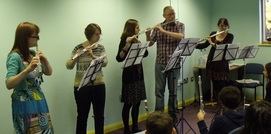 This week is NIACE's Adult Learners' Week - obviously highly relevant to my MA research and my interests. The Associated Board of the Royal School of Music (ABRSM) estimates that over 17m UK adults play an instrument, with 2.5m of those attending music lessons. A recent survey of adults discovered that playing a musical instrument is second (only to cooking) in the list of skills people would like to learn. I've been asked what the point of my research is (has any researcher NOT been asked that?!) and that is part of the point - with so many people playing, learning or wanting to learn an instrument, how do we best cater for their needs? Finding out what they say and think about learning music is, I think, vital to shaping music education that works for adults. One common theme in existing studies on adult music learners is the influence of teachers - how a 'bad' experience with a teacher can put off someone from learning an instrument. Often this happens at a young age, and part of the job of teachers working with adult 'returners' can be to help them renegotiate their relationship with music - change the way they think of themselves in relation to playing an instrument and indeed 'being a musician'. On the other hand, existing research also shows the wonderfully positive influence of good teachers, at all ages, in fostering lifelong love of music and confidence in taking part in musical activities. A major part of my dissertation looks at how adult learners describe their teachers and their relationships with them. My teacher survey revealed that teachers recognise there is a difference between teaching adults and children, and talk about a different set of 'skills' that are needed - an ability to adapt to different learning styles and challenges, different ways of communicating, and mentions of confidence-building, empathy and understanding. The results of my corpus analysis, searching for how learners talk/ write about teachers, suggest that learners don't describe these things as 'skills', but are tend to describe teachers' characters and how they make them feel. As a brief snapshot, some of the collocates (words appearing in juxtaposition with teacher(s)) I've been writing about this morning include horrified, dreaded, nags and traumatised on the negative side, and thrilled, magnificent, inspires and encouragement on the positive. Some fascinating metaphorical language appears including rotting, shreds, whip, ogre, flogging and murdering (I'm pleased to say that doesn't all refer to one particular teacher or lesson)! Overall, it's suggesting that music teaching very much needs to pay attention to that customer service adage about "how you make people feel". This coming weekend, I'm running a workshop for my students along with Sheffield Flute Choir (a group I run for adult players), followed by an informal concert in front of their family and friends. Participants range in age from eight up to approaching retirement. For some of them, including several adults who took up the flute just this year, it will be their first time playing in front of anyone other than me and whoever shares their home. I'm hoping it's an experience that leaves them feeling inspired and encouraged. 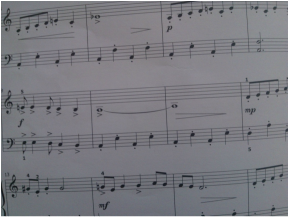 You might have heard of a Grade-One-athon before, or maybe not! Normally it involves an - often sponsored for charity - attempt to pick up an instrument you've never played before, enter and pass a Grade One exam within a term. I've known quite a few music teachers and other people who already play an instrument give it a go - sometimes it's been a quick challenge, and sometimes it's led to a love of an additional instrument that they've kept on playing long past Grade One. I'm not exactly doing that, as my challenges don't involve instruments that are 'brand new' to me. But this term I'm sitting two Grade Ones, and here's why... Piano - I don't remember exactly when and how I learned which notes were which on the piano. As a child interested in music I picked it up here and there I think, learned a bit from friends who had lessons. I had a keyboard from a really early age - at first one of those tiny Casio ones which the endlessly annoying 'demo' tune! When I started to take music more 'seriously' I had piano lessons, eventually auditioning on it as a second instrument for University. Although I did play a bit at Uni, for some reason that I can't remember either, we didn't get second instrument lessons in the end, so it fell by the wayside. That is, until my flute teaching started to increase, and I realised that I could play some of the simpler accompaniments to my student's pieces. And more than that, I actually really enjoyed playing them. I like being able to introduce students to playing with another instrument, and for those who do exams, it's lovely to be able to go along and accompany them for those first few early grades, to be a familiar face in an unfamiliar situation. The more I played the piano, the more I enjoyed it, and the more I wanted to improve, which led me to the idea of getting some lessons and maybe doing some exams. I had no real idea of what standard my piano playing was, but I really wanted to go back to basics, and gain more confidence with it. So this July, I'll be sitting Grade One piano. It's been fantastic to concentrate on some relatively simple pieces and get to grips with the detail of them, to start understanding different piano techniques and gradually start to feel like I can play music on it, rather than just learning notes. And to have help from a piano-teaching friend to guide me through all this, to point out the things I don't notice when I'm busy concentrating on everything else! 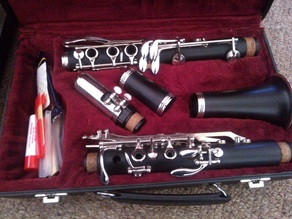 Clarinet - I played a clarinet once at school, when a good friend let me try hers. It was difficult to blow and I didn't like it anything like as much as playing the flute! I hadn't tried to play one again until a couple of years ago, when I picked one up cheap and tried to have a go at it. I made some sounds, but they weren't particularly pretty and I found it hard to remember which fingers to use (clarinet fingering is similar to the flute in places, and different in others). I felt like my face was filled up with air and my head was going to explode. So it sat in its case for a while. This year though, I decided to try again. I really thought about and analysed what was happening with my breathing, and how it was different from the flute which uses a lot more air. I had been doing a bit of recorder-playing and that helped with the fingering (eventually I moved from thinking "bottom octave = treble recorder" to it almost coming automatically). Again, I had some informal lessons with a friend who teaches clarinet, which was invaluable for details of technique that I wouldn't have picked up or known about myself, and spotting things like my stray little finger sticking out - something I never do on the flute, but put my fingers at a different angle and funny things happen! And I thought, why not, do an exam, see if you can properly learn some pieces and perform them in front of someone? So, yes, Grade One clarinet will also be happening this July. As well as expanding my playing skills onto different instruments, these little musical journeys have given me really valuable insights into being a beginner again. As a teacher, how I teach is influenced by how I was taught, by my experience as I teach different people, and by the reading I do and the training courses I go on. I also do a lot of thinking! But the experiences of picking up a (practically) new instrument and of re-starting an old one have helped me to remember what it's like to do something that feels really alien. To try to remember four different new physical skills at once. To try to translate the marks on the page to what your fingers etc are supposed to be doing - how that goes from being a process of 'working out' to one that's more 'automatic'. It's made me understand better what my adult students are feeling when they already have skills in other areas, even in other instruments, but they're trying to learn something new from scratch. But also to remember how good it feels to make progress with something that felt almost impossible to begin with. To confirm to myself, that indeed, you aren't too old to learn. And how exciting it is to be at the beginning of a journey, not knowing exactly where it will lead! (I also want to say thank you to the two people who've helped me out with lessons and advice, patiently listened to my squeaks and my randomly loud left-hand piano notes, answered my silly questions and entered me for the exams - thank you!) In part one of this post, I talked about the technology - mainly iPad apps - that I use in teaching. Today's post is about the less techy, but no less useful, gadgets that I carry around! The 'physical' gadgets I use mostly involve blowing. The flute is a bit of an oddity in the way you 'blow' - for most woodwind instruments you blow down into the instrument to make a sound. Lots of people have played the recorder at school and often beginners will try to blow down the flute in the same way. But on the flute the breath needs to go across the lip plate, hitting the 'riser' or 'chimney' inside to make a sound. Helpful image from http://www.justflutes.com/blog/ian-mclauchlans-guide-to-making-a-headjoint-the-riser/ showing the parts of the headjoint. I remember as a beginner being taught that it was a bit like blowing across a bottle, and attending a fabulous flute day where we all blew bottles, 'tuned' to different notes with different amounts of water in them, to play a piece. It would be a bit awkward to carry a glass bottle around to all my lessons, but thankfully there is a bit of flute 'kit' which helps students get to grips with 'blowing across'. Presenting, the Pneumo Pro (and my chin)... 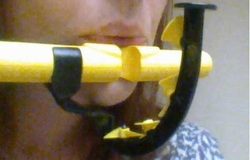 The Pneumo Pro is a plastic replica of a flute headjoint, with a gap to let the air through and what is basically a collection of small windmills attached. A couple of my younger students know it as the "helicopter thingy". Essentially, it's a fabulous way of seeing where you're blowing - you blow across, and the windmills go round. It's great for getting to grips with the initial idea of blowing across, but also useful as students progress. The different height windmills relate to the different angles of blowing required to play in different octaves, so it's helpful for feeling the level of lip and jaw flexibility needed. And it can also be used for practising keeping a steady airstream, both soft and strong, and for making sure that tonguing isn't getting in the way of the air. Plus, it's a bright yellow, fun, "helicopter thingy", what's not to love?! The other bit of equipment I've used quite a lot is a straw. Squeezing a straw to narrow it and blowing through helps to feel the 'diaphragm' muscles which are needed for breath support, another one of those things which is easier to grasp through feeling it than through explanations! But partly inspired by new website Flutemotion, which sells all sorts of flute gadgets, I've recently invested in some more fun ways of demonstrating and practising breath support, and now have a stash of these... 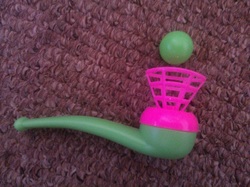 This simple pipe and ball toy (bought in bulk from a kids 'party bag' toy supplier) does the same job as the straw, but with the added bonus/ challenge of having to keep the ball in the air. It really helps you feel those breath support muscles engage, and kids (and big kids) like testing themselves with how long they can keep the ball up each time. It's only disadvantage is having to retrieve said ball from the floor/ other side of the room several times per lesson! I'm currently awaiting a delivery of some whistling lips to try out, and am planning a few games of Blow Football at my next student workshop... 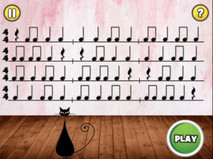 Rhythm Cat (©LMuse Ltd) Rhythm Cat (©LMuse Ltd) With that reference to Inspector Gadget, I suspect I'm dating myself a little! I grew up in a (not that long ago, honest) age, unimaginable to some of the youngsters I teach, without iPads, iPods, YouTube or Facebook. All my school – and music theory – work was done on paper. If I wanted to hear a piece of music, I had to buy a recording, listen out for it on the radio or go to a concert. Downloading music was a very new thing! This isn’t a post about the ‘good old days’ though. Technology is a hot topic with music teachers, with articles in magazines about the latest software, apps and gadgets to help with teaching. I’m generally a fan of technology so I've investigated quite a few of these, and adopted some for use in my lessons. I use quite a few internet resources for sheet music and theory (see my links section for info on some of these), but today I'm concentrating on my favourite apps - mainly iPad but some of these are available for Android and other systems too. Rhythm Cat (http://melodycats.com/rhythm-cat/) Rhythm Cat was one of the first musical apps I downloaded, drawn in by the name! It's a game which gradually builds rhythm skills, teaching how note values match up to sounds. There's a great, really varied soundtrack to play along to, and some beautifully-designed cat-related graphics. AuralBook (http://www.auralbook.com/gb/ad/abrsm/en/pc.php) There are a few apps for testing and improving aural skills - those skills of clapping in time, echo singing, sight-singing etc, which build general musicianship and are part of the ABRSM exams. ABRSM themselves offer the Aural Trainer, which is pretty good. AuralBook has a couple of advantages over this though - for one thing it's free, the full version for all eight grades. It also doesn't just play exercises or record your responses - it does both of these, and analyses your responses! So it plays you a melody, you sing it back, it records your singing and compares it to the original. Same with your clapping to see if it's in time. The one offputting aspect is the tone of voice of the 'examiner' who asks the questions and tells you how you've done - it's quite abrupt and doesn't pull any punches when it comes to saying you've made a mistake. Even the "wow" when you get something perfectly right sounds a bit sarcastic. But I've found if I warn students about this in advance, we end up having a giggle about it - one asks me if I've "brought the rude woman this week"! ScaleHelper (http://www.scalehelper.co.uk/) Another app that 'listens' to you! This one tests your scales and arpeggios - again, recording them and comparing them against how they should sound, checking notes, tuning, speed and rhythm. You can work on a particular scale, or ask it to 'challenge' you which prompts you with scales picked randomly from the appropriate syllabus. You get a mark and a really detailed note-by-note analysis, plus a big cheer if you do well! I've found this one really motivating for some students, being driven on to get a better mark. The big downside to this one is the price - there's a free version but that's quite limited. The full app is £4.99 and then there are further costs to download exam syllabuses (sets of scales for each grade). I also like ScaleBox - although this doesn't 'mark' the scales for you, it encourages self-assessment which is a really useful skill to develop. 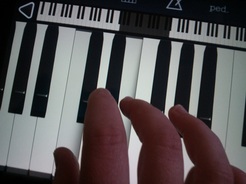 Alongside these apps, I make use of a metronome (lots of free ones available), a piano app which gives you a small playable keyboard on the screen (handy for theory - explaining intervals etc), and a recording app - again really helpful for encouraging students to listen to and self-assess their own playing. My favourite is Voice Record Pro which is free but has lots of useful features, including the ability to upload and share recordings online - handy if students want to keep a copy of their recording. Not all teachers are fans of apps and gadgets – I’ve heard them dismissed as gimmicks, a waste of time, or only used as a ‘treat’. I use them as part of a range of materials, and I do think you need to take as much care testing them out and assessing them as you do with any teaching materials, tutor books etc (so yes, I have sat at home and gone through all eight grades on AuralBook, and all the levels on Rhythm Cat)! Just as there are books I choose not to use as a teacher, there are apps that I’ve decided were badly designed, pointless, or just confusing to use. I make sure the ones I use actually teach students something, but I also want them to be intuitive to use and fun too. Part two of this post - coming soon - will look at more 'physical' gadgets, including the "helicopter thingy" that my youngest pupils are very keen on! 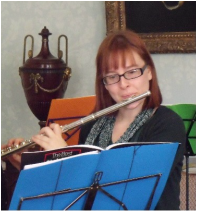 Rather like your first music lesson, writing your first blog post can be both exciting and a little nerve-wracking! I’m blogging because I’ve got lots of ideas I want to write about, but this first post is a quick one to say hello, a bit about me and what I’ll be blogging about. So, hello! I’m a flute and music theory teacher, and I also work teaching baby and toddler music classes. Between those, I currently teach music in various forms to people aged between about six weeks and sixty years! I play in local ensembles around Sheffield and Yorkshire, and run a group for adult flute players. I’m also a part-time distance learning student, in the final year of a Masters in English Language with Lancaster University. When I left school, my English teacher wrote in my school yearbook that she hoped I’d enjoyed her classes “almost as much as music”, and the truth is that I have a lifelong fascination with both! I think there are lots of connections and similarities between how we learn and use language and music, the roles they play in our lives. I’m interested in ‘sociolinguistic’ approaches, which examine how language is used to express identity, social relationships and attitudes, and I’m particularly intrigued by how language is used by musicians, musical organisations, music teachers and even in musical tutor books. I’m currently working on my MA dissertation which is about adult music learners. Using linguistic analysis techniques (more about those in later posts), I’m analysing a large data set (or ‘corpus’) which consists of text where adult learners talk/ write about themselves. The aim is to find out the main ‘discourses’ of adult learners. What are their priorities, their challenges, their feelings about learning music? How do they describe themselves and their experiences of learning music? I’ll be blogging about my research and related topics over the coming months. You can also expect posts about flutes, performing, teaching and music in general. Comments are very welcome (but do need to be approved to avoid spam and nonsense, so won’t appear immediately) – I’d love to hear your views! |
Keep in touch
I have an email newsletter where I share my latest blog posts, news from the flute and wider musical world, my current projects, and things I've found that I think are interesting and useful and would love to share with you. Expect lots about music and education, plus the occasional dip into research, language, freelance life, gardening and other nice things. Sign up below! Archives
July 2019
Categories
All
|

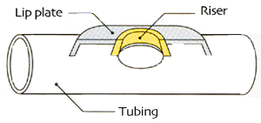
 RSS Feed
RSS Feed
